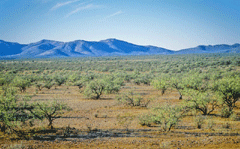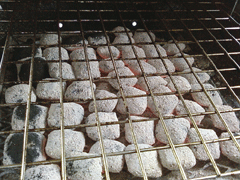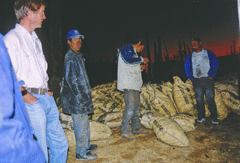Green Grilling
Air Date: Week of May 23, 2008

Small mesquite trees like these dot the Sonoran Desert but they are too small to be efficiently harvested for charcoal. (Courtesy of Matthew Taylor)
As warm weather comes around, so does heated debate about whether to use charcoal or propane in the grill. Each method has its pros and cons. Living on Earth’s Bobby Bascomb reports on what the eco-conscious BBQer should fire up this summer.
Transcript
GELLERMAN: It’s Living on Earth. I’m Bruce Gellerman. Memorial Day’s marks the beginning of summer – time to fire up the grill, kick back and relax. But before you sink too deep into that chaise lounge, consider this profound philosophical question: gas or charcoal? What’s the eco-friendly way to go? Living on Earth’s Bobby Bascomb has the answer, hot off the grill.
[PROPANE SOUND, CLICKING, WOOSH OF FIRE STARTING. BASCOMB ASKS ‘SO WHAT ARE YOU COOKING?’ CHICKEN SIZZLES]
BASCOMB: You might be wondering what to cook on your grill, but Tristram West from the Department of Energy’s Oak Ridge National Laboratory has been working out what to cook with. He’s decided on charcoal.
WEST: Essentially charcoal’s a renewable fuel. It’s derived from wood, so the net emissions are considered zero.
BASCOMB: In life, trees absorb carbon dioxide. In death, they release it, whether they rot in the forest or burn in your barbeque. So, according to West, when charcoal is burned it’s closing a carbon-neutral cycle.

Charcoal briquettes are made from scraps of waste wood pressed together and subjected to a low-oxygen environment. (Courtesy of F Frias)
BASCOMB: But the debate in Southern California, an area notorious for its air pollution, is not about carbon dioxide; it’s about the particulate matter and pollutants that are released by burning charcoal. Sam Attwood of the California South Coast Air Quality District:
ATTWOOD: The propane fuel is just inherently much cleaner than burning with charcoal briquettes.
BASCOMB: So, you’re saying that burning a fossil fuel is cleaner than burning charcoal, which is a wood derivative?
ATTWOOD: Yes, in this case because it is a gaseous fuel that burns with a much more complete combustion than a charcoal briquette, the amount of pollutants will be much, much smaller. When you think about, let’s say, burning a log in your fireplace the pollution is so great that you can actually see visible emissions.
BASCOMB: Attwood’s especially worried about lighter fluid, the flammable liquid impatient people pour on charcoal to get it started. In 1990 Southern California required that makers of lighter fluid cut the air polluting ingredients in their products by half. Sam Attwood says the results were significant.
ATTWOOD: We found that just the starter products alone were responsible for several tons per day of the so-called volatile organic compound emissions. Now that’s equivalent to a pretty large oil refinery.
BASCOMB: So, burning lighter fluid causes air pollution. But the Department of Energy says the actual grilling isn’t a big deal. It estimates that on the fourth of July, the busiest grilling day of the year, barbeques will only generate about one percent of the total carbon dioxide emissions in the U.S. And the DOE’s Tristram West still sides with charcoal as a renewable resource.
WEST: About 90 percent of all the wood used for charcoal is all essentially wood waste from lumber yards. So it’s not as though we’re going in and cutting down trees so we can grill hamburgers.

University of Denver geography professor Matthew Taylor (left) with charcoal harvesters in the Sonoran Desert. (Courtesy of Matthew Taylor)
TAYLOR: I call the North American demand for charcoal a demand for a chic grilling fuel.
BASCOMB: That’s Matthew Taylor, professor of geography at the University of Denver. His research in the Sonoran desert suggests that demand for mesquite charcoal is leading to deforestation. But paradoxically there’s no shortage of mesquite saplings.
TAYLOR: If anybody has driven through southern Arizona, Northern Mexico, you will notice a mesquite infestation, and that’s a consequence of running cattle in the area. The cattle eat mesquite pods during dry times, and then they wander off and the mesquite seeds are passed through their system and you have a wonderful sprouting of new mesquite all over.

Small mesquite trees like these dot the Sonoran Desert but they are too small to be efficiently harvested for charcoal. (Courtesy of Matthew Taylor)
TAYLOR: So you get this little, tiny, multi-stemmed mesquite that looks very scrubby and shrubbyish. That’s not good for charcoal. You’d have to go and cut down hundreds of those where as you’d have to cut down one old-growth mesquite, and some of those are several hundred years old. There’s definitely deforestation associated with that.
BASCOMB: So, what’s a green griller to do? It’s a simple question but there’s no easy answer. Propane burns cleanly, but is non-renewable. Charcoal briquettes are renewable, but may pollute. Hardwood charcoal could cause deforestation, but it tastes great.
Confused, I’m Bobby Bascomb for Living on Earth
[FOOD SIZZLING ON GRILL; I THINK IT’S DONE; CLOSE LID]
Links
Living on Earth wants to hear from you!
Living on Earth
62 Calef Highway, Suite 212
Lee, NH 03861
Telephone: 617-287-4121
E-mail: comments@loe.org
Newsletter [Click here]
Donate to Living on Earth!
Living on Earth is an independent media program and relies entirely on contributions from listeners and institutions supporting public service. Please donate now to preserve an independent environmental voice.
NewsletterLiving on Earth offers a weekly delivery of the show's rundown to your mailbox. Sign up for our newsletter today!
 Sailors For The Sea: Be the change you want to sea.
Sailors For The Sea: Be the change you want to sea.
 The Grantham Foundation for the Protection of the Environment: Committed to protecting and improving the health of the global environment.
The Grantham Foundation for the Protection of the Environment: Committed to protecting and improving the health of the global environment.
 Contribute to Living on Earth and receive, as our gift to you, an archival print of one of Mark Seth Lender's extraordinary wildlife photographs. Follow the link to see Mark's current collection of photographs.
Contribute to Living on Earth and receive, as our gift to you, an archival print of one of Mark Seth Lender's extraordinary wildlife photographs. Follow the link to see Mark's current collection of photographs.
 Buy a signed copy of Mark Seth Lender's book Smeagull the Seagull & support Living on Earth
Buy a signed copy of Mark Seth Lender's book Smeagull the Seagull & support Living on Earth

